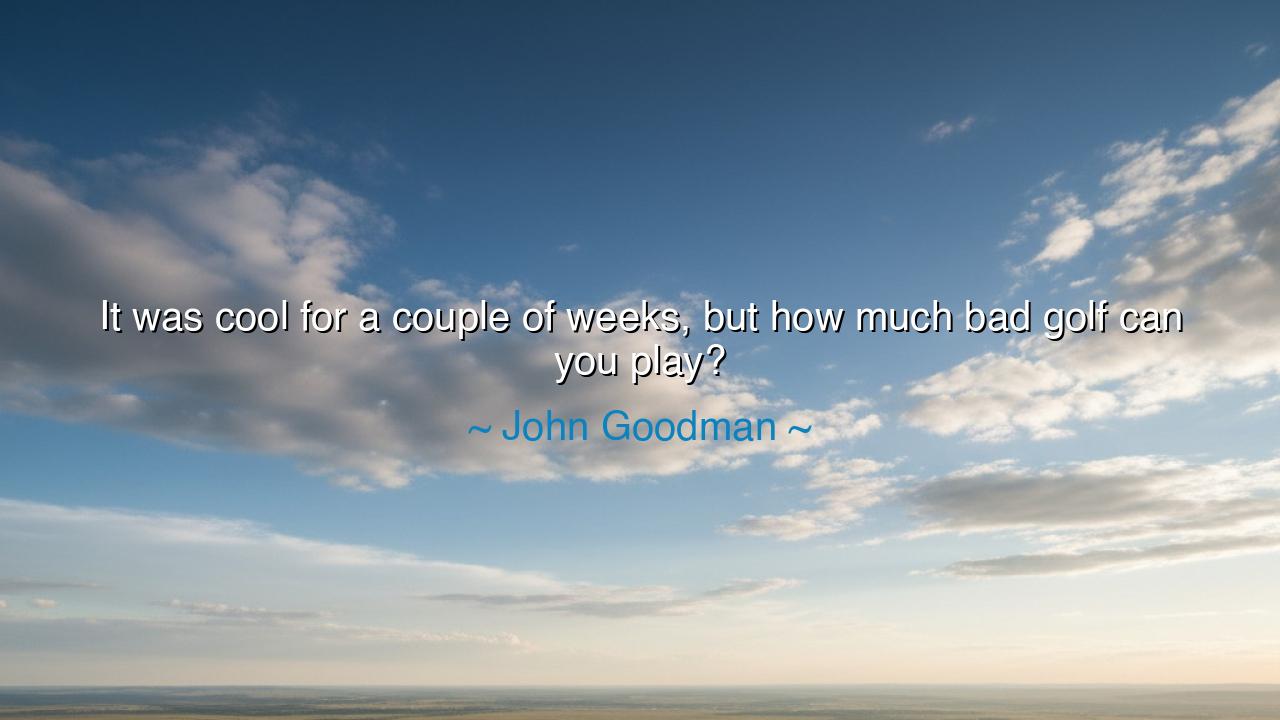
It was cool for a couple of weeks, but how much bad golf can you






In the journey of life, there are moments when we are drawn to new pursuits—activities that seem to hold the promise of joy, achievement, or simply a break from the ordinary. Yet, as John Goodman reflects in his words, "It was cool for a couple of weeks, but how much bad golf can you play?" we find that even the most promising of endeavors can lose their luster when they fail to deliver the results we expect. The excitement fades, and the thrill is replaced with frustration and disillusionment. This statement encapsulates a profound truth: there are pursuits in life that, while enticing at first, lose their appeal when we confront the reality of struggle and failure.
In the ancient world, even the greatest heroes faced moments of doubt and weariness in their quests. Hercules, the mighty demigod, was tasked with completing twelve nearly impossible labors, each more arduous than the last. At first, his strength and courage carried him through with ease, but there came moments when the burden of his tasks became too much. He was not immune to the feeling of exhaustion or the weight of repeated failure. Yet, unlike a game of golf that might lose its appeal after a few missed shots, Hercules pushed on, driven not by the hope of immediate success but by a deeper resolve to fulfill his purpose.
Similarly, the great Odysseus faced a journey that spanned decades, filled with setbacks, temptations, and endless obstacles. His desire to return home was often thwarted, and at times, it seemed as if he would never find the end of his trials. But unlike a fleeting interest in a pastime like golf, Odysseus' purpose was rooted in a deeper calling, a commitment to his family and his homeland. His story teaches us that the dissatisfaction that arises when we face failure or difficulty can either cause us to abandon our pursuit or drive us to pursue it with greater wisdom and resolve.
This frustration with repeated failure is not unique to ancient heroes. It is something that resonates deeply in the lives of ordinary people, who may seek fulfillment in various hobbies, relationships, or careers, only to discover that the excitement of the beginning fades in the face of reality. A person may take up a new activity, like golf, with enthusiasm and anticipation, only to find that the pursuit demands more patience, practice, and perseverance than they initially imagined. The joy of the game, at first fresh and exhilarating, can be overshadowed by the disappointment of poor performance. Goodman’s statement reflects this universal truth: no matter how appealing something may seem, the path to mastery is fraught with moments of frustration.
However, this very frustration can become the key to deeper growth. Take the example of Thomas Edison, who famously said, “I have not failed. I’ve just found 10,000 ways that won’t work.” His pursuit of the light bulb was not without its own share of repeated failures. Yet, where many would have given up after a few weeks of bad results, Edison embraced his mistakes as necessary steps toward eventual success. He understood that every failure brought him closer to understanding what would ultimately work. It was not the pursuit itself that mattered, but the commitment to learning and improving along the way.
In life, we all face moments where the new or the exciting loses its appeal. The joy of a new hobby, like golf, or the thrill of a new relationship, career, or creative endeavor, can fade when faced with repeated struggles. But it is precisely in those moments of disappointment that we are given the opportunity to decide whether to abandon the pursuit or to face the challenge with renewed strength. The choice is not always easy, and it requires us to confront the uncomfortable reality that success is not always immediate or guaranteed.
The lesson here is clear: the journey is as important as the destination, and the struggles along the way are often the true teachers. In every endeavor, whether it is golf, a career, or a relationship, there will be moments when the excitement fades, and we are left with the choice to either persist or walk away. It is in those moments that we must remind ourselves that growth comes not from avoiding failure but from learning how to navigate it. Just as Hercules and Odysseus endured, so too must we find the courage to continue, knowing that the greatest triumphs come not from perfection, but from perseverance.
So, let us embrace the challenges we face with a spirit of resolve and patience, understanding that frustration is often the crucible in which our character and skill are forged. If golf, or any pursuit, begins to feel like an exercise in failure, let us not be discouraged, but rather view it as an opportunity to grow—to improve not just our abilities, but our approach to life itself. Whether we stick with the game or move on to another, the important thing is to embrace the journey with an open heart, knowing that true success lies not in avoiding the discomfort, but in enduring it and learning from it.






AAdministratorAdministrator
Welcome, honored guests. Please leave a comment, we will respond soon